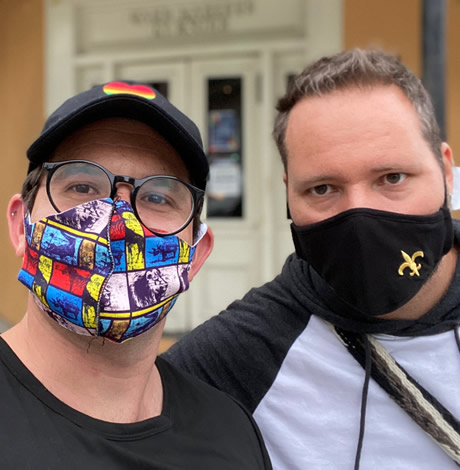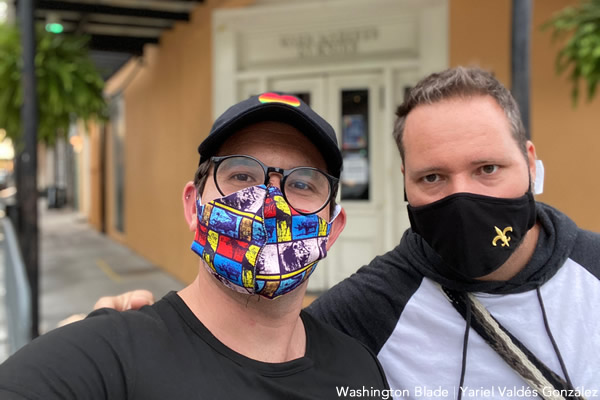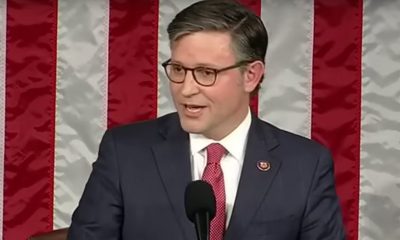Opinions
2021 is the year to dream big
Yariel proves immigrants really make America great


It goes without saying that most of us are more than happy to see 2020 come to an end, but even this dumpster fire of a year could not extinguish the will to fight for a better life. The effort to secure Washington Blade contributor Yariel Valdés González’s release from U.S. Immigration and Customs Enforcement custody is no better example of what is possible.
Valdés and International News Editor Michael K. Lavers share their thoughts about the past year.
By YARIEL VALDÉS GONZÁLEZ
Today I am thinking of the first day of the year and what I asked Santa for Christmas. I was at an immigrant jail in Louisiana, imprisoned for seeking political asylum. Judge Timothy Cole on Sept. 18, 2019, granted me asylum, but a government appeal kept me behind bars, and diminished my hopes of being truly free at every turn.
Resorting to Santa, a childish character in whom adults should not believe, shows how desperate I was. I simply wanted the freedom that I had earned and for which I had suffered so much in Cuba and, incredibly, in the United States. Santa three months later finally granted my wish. I guess immigrants are a low priority for such an honorable and busy character.
My true Santa was really Michael K. Lavers, my brother, my colleague and this publication’s international news editor. It would have been impossible to emerge victorious in this battle without his constant support. I can now dream of a future without persecution because of my profession or ideas thanks to him, my family, and many other people.
Instead, my Santa in 2020 came from the hand of love, which does not need desperate pleas, but tenderness and devotion. Receiving gifts on this date does not exactly fit into the traditions of my native country, whose Communist regime has crushed the Christmas spirit for decades.
I can proudly look back on 2020 without forgetting from where I come. While the whole world tries to erase it from memory, it has been my “Year Zero” when I began to build my new life in every way.
This year has put many challenges and new experiences in front of me: The first and most difficult one was to be released from ICE custody, which kept me in their jails for 11 months. Then came learning how to drive (it wasn’t that difficult); perfecting my rustic English (a task that has not yet been completed); working in a restaurant (I had never done anything outside of media before); be independent (I moved to Wilton Manors with my boyfriend); support the new president as an activist; collaborate with this newspaper that gives me the opportunity to support my community; stay healthy in the middle of this pandemic and endure the sadness that I feel each day for the family and friends I left behind, among other things.
The year that we begin today is going to be better. And I say this as an imposition because it is our positive spirit that will help us overcome all the bumps in the road and will allow us to look to the new year with hope.
Welcoming 2021 in the magical place of Walt Disney World has definitely contributed to that, but above all I am confident that I will not be alone on this journey of growth that has opened up in front of me. Conquering 2021 may seem like an overly pretentious plan, especially for an immigrant who is just beginning to take his own steps in this great country. But if I have learned anything in life, it is to dream big, and 2021 will not be the exception.
By MICHAEL K. LAVERS
Tears were welling up in my eyes on Aug. 8, 2019, when I promised Yariel’s mother in Cuba during a phone call from his aunt and uncle’s home in suburban Miami that I would do everything in my power to secure her beloved son’s release from ICE custody. It took far too long for that day to come, but on March 4 he was sitting in the passenger seat of my rental car as we drove away from the privately run River Correctional Center in rural Louisiana.
More than nine months later, I could choose to focus on the fact that Yariel spent nearly a year in the custody of an out-of-control agency that forces those who seek refuge in this country to endure abuse and dehumanization. I could choose to focus on politicians who use cheap rhetoric to advance a xenophobic agenda. I could choose to focus on the fact that I fractured my left arm hours before Yariel’s release and it took six months to heal. I will, however, avoid the chance to wallow in self-pity because that’s not what this op-ed is about.
Yariel is proof that immigrants truly make America great. He is now living with his boyfriend in Wilton Manors, and has become an active and productive member of the community. Yariel’s reporting continues to highlight the human rights abuses in Cuba that forced him to flee. His advocacy on behalf of other immigrants and ICE detainees continues to inspire me more than he will ever know.
This year has been horrible for so many reasons, but I am immensely thankful that Yariel in 2020 was finally able to begin living his best life in freedom without fear of persecution. He remains an inspiration to me and to countless others. ¡Te quiero mucho mi querido hermano!
Yariel Valdés González is a Blade contributor; Michael K. Lavers is the Blade’s international news editor.

In 2023, the law was signed to expand the District’s medical cannabis program. It also made permanent provisions allowing residents ages 21 and older to self-certify as medical cannabis patients. Overall, cannabis is fully legal in D.C. for medical and recreational use, and 4/20 Day is widely celebrated.
Medical cannabis, for example, has a long history with the LGBTQ community, and they have often been one of the oldest supporters of marijuana and some of the most enthusiastic consumers. Cannabis use also has a long history of easing the pain of the LGBTQ community as relief from HIV symptoms and as a method of coping with rejection from society.
The cannabis culture continues to grow in the District, and as a result, so does the influence on younger people, even youth within the LGBTQ community. Drug education can play an important role and should not be avoided during 4/20 Day. Parents and educators can use drug education to help their kids understand the risks involved with using marijuana at a young age.
According to DC Health Matters, marijuana use among high school students has been on the decline in the District since 2017. In 2021, it was estimated that around 20% of high school students use marijuana, a drop from 33% in 2017. Nationally, in 2020, approximately 41.3% of sexual minority adults 18 and older reported past-year marijuana use, compared to 18.7% of the overall adult population.
When parents and educators engage with their kids about marijuana, consider keeping the conversations age appropriate. Speaking with a five-year-old is much different than speaking with a teenager. Use language and examples a child or teen would understand.
The goal is to educate them about the risks and dangers of using cannabis at a young age and what to avoid, such as edibles.
Most important, put yourself in your kid’s shoes. This can be especially important for teenagers as they face different social pressures and situations at school, with peer groups, or through social media. Make a point of understanding what they are up against.
When speaking to them about cannabis, stay calm and relaxed, stay positive, don’t lecture, and be clear and concise about boundaries without using scare tactics or threats.
Yet, it’s OK to set rules, guidelines, and expectations; create rules together as a family or class. Parents and educators can be clear about the consequences without lecturing but clearly stating what is expected regarding cannabis use.
Moreover, choose informal times to have conversations about cannabis and do not make a big thing about it. Yet, continue talking to them as they age, and let them know you are always there for them.
Finally, speak to them about peer pressure and talk with them about having an exit plan when they are offered marijuana. Peer pressure is powerful among youth, and having a plan to avoid drug use helps children and students make better choices. Ultimately, it is about assisting them in making good choices as they age.
Members of the LGBTQ community often enter treatment with more severe substance use disorders. Preventative measures involving drug education are effective in helping youth make good choices and learn about the risks.
Marcel Gemme is the founder of SUPE and has been helping people struggling with substance use for over 20 years. His work focuses on a threefold approach: education, prevention, and rehabilitation.
Opinions
Walking the pathway to national cannabis legalization
Social equity needs to be front and center in our efforts

As we gear up for a major election year, the buzz around cannabis legalization is getting louder. Policymakers are starting to see the need for comprehensive reform, while advocates and small business owners in the industry are cautiously optimistic about the future. But let’s not kid ourselves, this system was designed to keep certain communities out, and it’s crucial that we continue to address these deep-rooted inequities as we blaze the trail forward. A step toward legalization that doesn’t prioritize equity and dismantle the barriers that have held back marginalized groups would be a major bummer. In this op-ed, we’re going to take a groovy journey through the evolution of grassroots organizing in the cannabis industry and highlight the importance of social equity in achieving true national cannabis legalization and boosting our humanity along the way.
Over the years, I’ve been right in the thick of it, helping to build grassroots organizations like Supernova Woman and Equity Trade Network. These groups have been on the frontlines, fighting for cannabis programs in Oakland and San Francisco. I’ve also rocked my own brand, Gift of Doja, and organized the first Cannabis Garden at a major neighborhood street fair, Carnaval San Francisco. I even served as chair of the first Cannabis Oversight Committee in the nation. But the real magic has always happened in when working in coalitions. Each individual and organization brings a unique piece to the puzzle. Grassroots organizing is as challenging as crafting a democratic society but is worth the effort in generating workable implementable solutions. Collective efforts have been game-changers in shifting public opinion and paving the way for major policy changes at both the state and local levels.
As we navigate the path toward cannabis legalization, lobbyists and lawmakers can’t forget about the small business owners who have been grinding to build their dreams. Political advocacy and lobbying are important, but if we’re not uplifting the voices and experiences of those who have been fighting on the ground, we’re missing the mark. Big companies can hire lobbyists, but small business owners don’t have that luxury and if we are not in the room we are on the table. Coalitions allow for us to be in the room when we can’t physically be there. Our communities, especially people of color, have been hit hard by systemic oppression, from over-policing to mass incarceration and limited economic opportunities to limit our ability to be in the room of power and decision making.
Social equity needs to be front and center in any cannabis legalization efforts. It’s not enough to just remove criminal penalties or create a legal market. We need to actively work on repairing the damage caused by years of prohibition. That means fighting for resources, investment, and low-interest loans for small businesses. It means creating a tiered fee and tax structure that doesn’t crush the little guys. And it means opening up equity programs to all industries, not just cannabis. Social justice without economic access and repair is like a joint without a lighter – it just won’t spark the change we need. We have a responsibility to evolve the economy and break down unnecessary barriers. Activism, social justice, and economic reform are all connected, man.
Industry leaders, culture creators, advocates, and consumers alike, we all need to step up and promote social equity. It’s on us to support initiatives that provide resources, mentorship, and funding for individuals from affected communities to enter the legal cannabis market. And let’s not forget the power of our wallets. Buying from companies that align with our values and support the work we believe in can send a powerful message. Voting with our dollars might just be more impactful than showing up at the ballot box.
As we head into a major election year, the cannabis industry is at a crossroads. It’s a time for drumming up voter interest and for candidates to make promises that grassroots organizations have fought hard for. Small business owners will be navigating a tricky landscape, but we can’t lose sight of the power of collective work. By keeping social equity at the forefront, we can undo the harms of the past while building new frameworks that will shape a brighter future for all.
In conclusion, grassroots organizing has been the driving force behind shifting public perception and pushing for policy changes in the cannabis industry. But let’s not forget that true national cannabis legalization can only be achieved if we address social equity. It’s time for us to come together, listen to the voices of those most impacted, and walk the high road towards a future where cannabis legalization isn’t just about business opportunities, but also about healing and empowerment for all communities. Let’s light up a joint of social justice and blaze a trail towards a better tomorrow.
Nina Parks is co-founder of Equity Trade Network & Supernova Women. Reach her at [email protected].
Commentary
World ‘isn’t much different today’
The Nazis murdered nearly 1 million Jewish people at Auschwitz

OŚWIȨCIM, Poland — Łukasz, a Polish man who was our group’s English-speaking tour guide at Auschwitz, on April 7 asked us while we were standing outside one of Auschwitz I’s barracks why the Nazis systematically murdered more than 6 million Jewish people.
“Once they are gone, Germany will be great again,” he said, referring to the Nazis’s depraved justification.
There were other Americans in our group of about 40 people. I would like to think they are familiar with the dehumanizing MAGA rhetoric to which our country has become accustomed since President Joe Biden’s predecessor announced his White House bid in 2015. The fact that I was at a Nazi concentration camp was simply overwhelming, and I didn’t feel like speaking with them or to anyone else at that moment.
The unspeakable horrors that happened at Auschwitz are on full display. Łukasz’s comment was a stark warning to us all amid the backdrop of the current socio-political realities in which we in the U.S., Europe and elsewhere around the world currently live.
• Suitcases, glasses, shoes, kitchen utensils, prosthetic limbs, baskets, Jewish prayer shawls, and toothbrushes that were taken from people upon their arrival at Auschwitz were on display in Auschwitz I’s Block 5. One exhibit also contains children’s clothes.
• Auschwitz I’s Blocks 6 and 7 had pictures of male and female prisoners along the corridors. They contained their birthdays, the day they arrived at the camp and when they died. Block 7 also had mattresses and bunk beds on which prisoners slept and the sinks and latrines they used.
• The basement of Auschwitz I’s Block 11 had cells in which prisoners were placed in the dark and starved to death. The basement also had cells in which prisoners were forced to stand for long periods of time. Executions took place at the “Death Wall” in the courtyard between Block 10 and 11. Guards also tortured prisoners in this area.
• Medical experiments took place in Block 10.
• A gas chamber is located near Auschwitz I’s entrance with the gate that reads “Arbeit macht frei” or “Work sets you free.” The adjacent crematorium contains a replica of the furnaces used to burn human bodies.
• An urn with human ashes is in Auschwitz I’s Block 4. Hair cut from people who were killed in the gas chamber was also there.

Auschwitz I, a former Polish army barracks, is one of 40 camps and subcamps around Oświęcim, a town that is roughly 30 miles west of Kraków, Poland’s second-largest city, that became known to the world as Auschwitz. Upwards of 90 percent of the 1.1 million people killed at Auschwitz died at Auschwitz II-Birkenau, which is roughly 1 1/2 miles northwest of Auschwitz I in the village of Brzezinka (Birkenau in German), and more than 90 percent of those murdered upon their arrival were Jewish.
The ruins of two crematoria the Nazis blew up before the Soviets liberated the camp in January 1945 are there. (A group of Israelis were praying in front of them while our group was there.) A train car used to bring people to the camp was also there, along with some of the barracks in which those who were not immediately killed in the gas chambers lived.
Auschwitz II-Birkenau’s sheer size is incomprehensible.

The Nazis killed 6 million Jewish people in the Holocaust. They also murdered gay men, Poles, Roma, Sinti and millions of other people from across Europe.
The day I visited Auschwitz marked six months since Hamas launched its surprise attack against Israel.
More than 1,400 people — including 260 people who Hamas militants murdered at the Nova music festival in Re’im, a kibbutz that is a few miles from the Gaza Strip — have died in Israel since Oct. 7, 2023. The subsequent war has left more than 30,000 Palestinians in the Hamas-controlled enclave dead, and millions more struggling to survive. Oct. 7 was the deadliest attack against Jewish people since the Holocaust. That unfortunate coincidence of dates — Oct. 7 and April 7 — was not lost on me while I was at Auschwitz.
Another striking thing is the area in which the camps are located.
The train from Kraków to Oświęcim passes through idyllic countryside with green meadows, flowering trees and freshly tilled fields. Purple lilacs — like those that bloom each spring on the trees in my mother’s backyard in New Hampshire — were in full bloom inside Auschwitz I. Grass and dandelions were growing amid the remains of Auschwitz II-Birkenau’s barracks. Birds were chirping. The weather was also unseasonably warm with temperatures well over 80 degrees and a cloudless sky.
All of it was beyond surreal.
I visited Auschwitz while on assignment for the Washington Blade in Poland. I interviewed gay Deputy Polish Justice Minister Krzysztof Śmiszek in Warsaw and sat down with activists in the Polish capital and Kraków to talk about the country’s new government and the continued plight of LGBTQ refugees from Ukraine and other countries. My trip began in Budapest, Hungary, and ended in Berlin. I did not write this piece until I on my flight back to D.C. on Tuesday because I could not properly articulate my thoughts about what I saw at Auschwitz.

Governments, politicians, political candidates, and parties in the U.S. and around the world have used specific groups of people to advance a particular agenda, to blame them for what is wrong in their particular country and/or to deflect blame from their own failures. The Nazis and what they did to Jewish people and anyone else they deemed inferior is the most grotesque example of what can happen if such actions are not stopped.
Łukasz told us outside of one of the Auschwitz II-Birkenau barracks at the end of our tour that the world “isn’t that much different today.” He also said that we are “witnesses.”
“It’s up to you how you react to it,” said Łukasz.
Let’s hope we all do our part to make sure the atrocities that happened at Auschwitz never happen again.




















